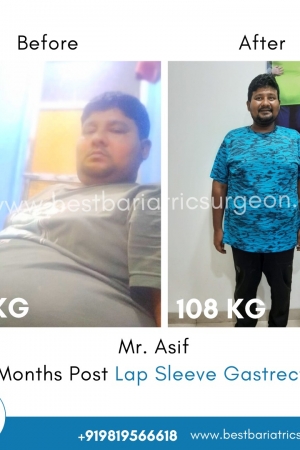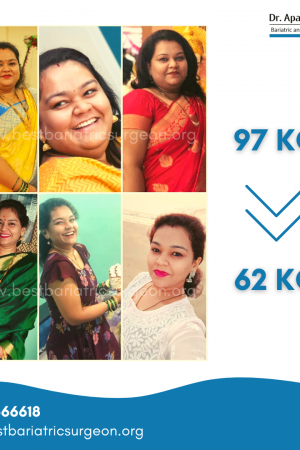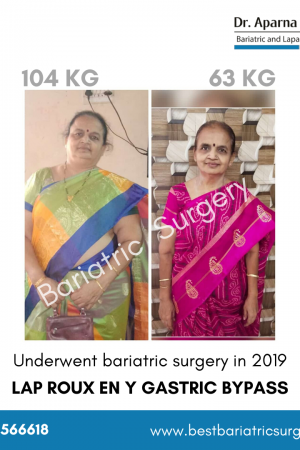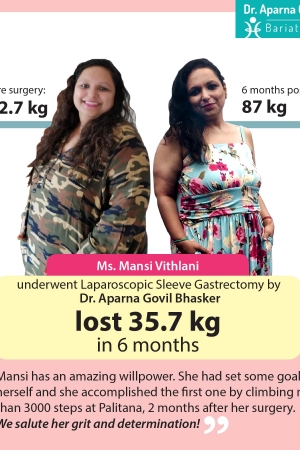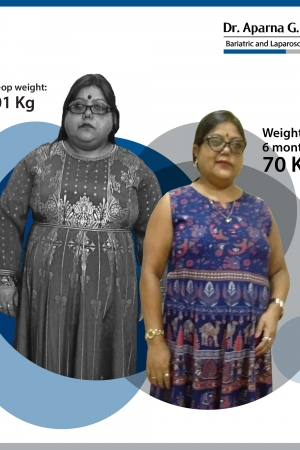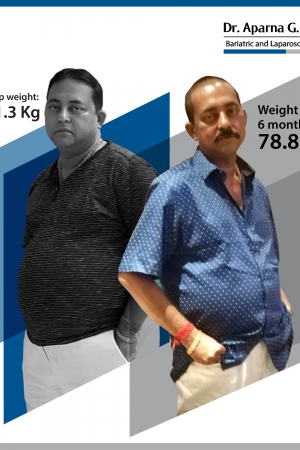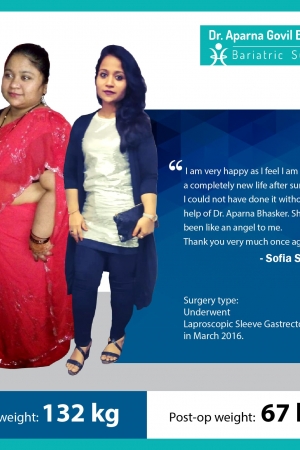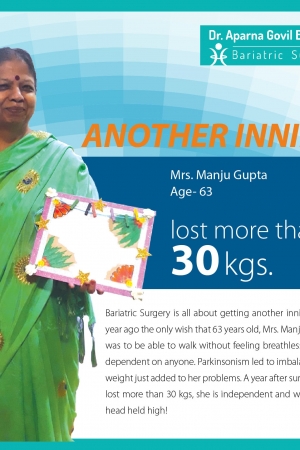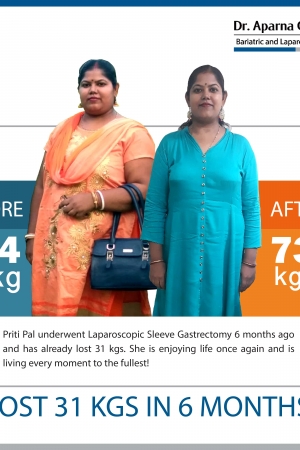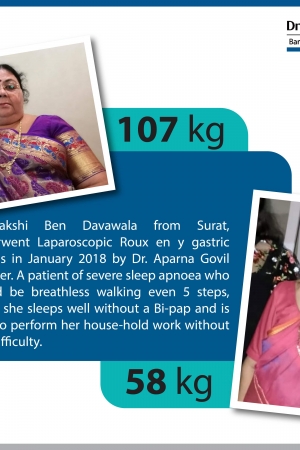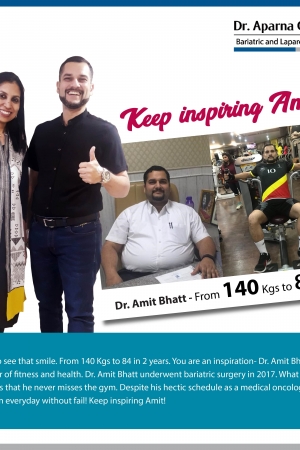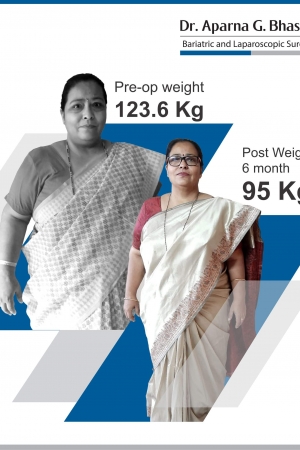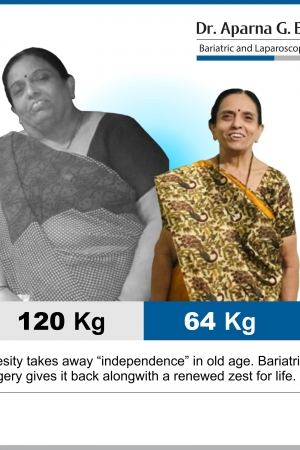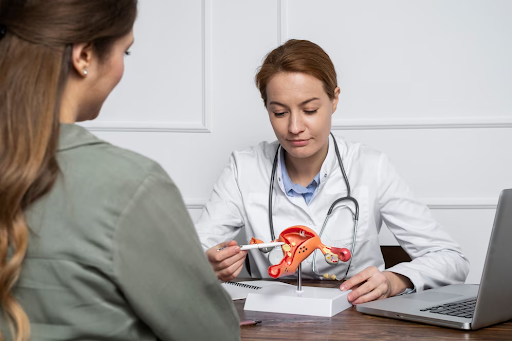
Laparoscopic Sleeve Gastrectomy in Kolkata (Gastric Sleeve Surgery)
- Home
- Bariatric Surgery in Kolkata (Weight Loss Surgery)
- Laparoscopic Sleeve Gastrectomy in Kolkata (Gastric Sleeve Surgery)
Laparoscopic Sleeve Gastrectomy in Kolkata (Gastric Sleeve Surgery)
Laparoscopic sleeve gastrectomy is one of the most popular bariatric/weight loss procedures being performed across the world. It was started in the late nineties. Initially it was performed as the first part of a duodenal switch surgery in super-obese patients. Later it was observed that the sleeve gastrectomy alone produced good weight loss results and many times a second stage was not required. It is being practiced as a stand-alone weight loss procedure for about two decades now.
laparoscopic sleeve gastrectomy in Kolkata: Surgical Procedure
As the name suggests, laparoscopic sleeve gastrectomy in Kolkata is performed through the keyhole approach. 5 tiny cuts are made on the tummy and a camera is inserted through one of the ports. The entire surgery is performed looking at a monitor. Once the trocars are inserted the abdomen is visualized internally. Stomach is separated from an internal layer of fat called as the omentum. During this procedure the stomach is divided vertically using surgical staplers. What remains inside is a narrow tubular stomach. Post surgery, the stomach capacity reduces to one-tenth of the original capacity. The remaining stomach is removed out of the body.
How it works: laparoscopic sleeve gastrectomy in Kolkata:
As explained above, the capacity of the stomach reduces by one-tenth, patients are able to consume very little food after the surgery. Food intake is restricted and the stomach feels full much faster. The part of stomach which is removed outside, contains a hormone called “ghrelin” which induces hunger. Ghrelin levels reduce by approximately 80% after a sleeve gastrectomy and this leads to a significant reduction in hunger. Hence, patients eat less, feel full earlier and do not feel hungry after this surgery. In addition to this, food passes down into the intestines much faster and this leads to release of certain gastro-intestinal hormones that also augment weight loss.
Expected weight loss after laparoscopic sleeve gastrectomy in Kolkata:
After a laparoscopic sleeve gastrectomy, the weight loss happens over 12 to 18 months. Most patients lose about 70 to 75% of their excess body weight. Weight loss is the fastest in the first 3 to 6 months after which it tends to slow down. Weight loss results as well as weight maintenance are better in patients who embrace lifestyle modification after surgery. A healthy diet and an hour of daily exercise goes a long way in maintaining a good weight after surgery.
Improvement in other diseases:
A laparoscopic sleeve gastrectomy leads to significant improvement in diseases associated with obesity. There is a marked improvement in type 2 diabetes, high blood pressure, cholesterol levels, uric acid levels, PCOD, joint pains, sleep apnoea, fatty liver and other diseases. There is a significant decrease in the number of medications that the patients were on earlier. Weight loss also leads to improved confidence. In general, the quality of life is much better after any kind of weight loss procedure.
Procedure and course after laparoscopic sleeve gastrectomy in Kolkata:
Once you decide to undergo bariatric surgery, you will need to undergo investigations. These include blood tests and radiological tests. An upper GI endoscopy will also be done. A sleep study will be done if you have symptoms of sleep apnoea. A physician fitness and anesthesia fitness will be done after your investigations are done. 7 days before the surgery, you will be started on a high-protein liquid diet. This diet not only helps to lose some weight before the surgery but also reduces the swelling on the liver, thus making surgery easier and safer.
You will be admitted to the hospital, the evening before the surgery for pre-surgery preparation.
After the surgery, you will be kept nil by mouth. You will be made to walk after 4 to 6 hours of surgery and from the next day oral liquids will be started. You may get discharged either on day 1 or the morning after that.
You will be on liquids orally for the first 15 days, followed by semi-solids for another 15 days. You can join work after 7 to 10 days of surgery.
Risks and complications after laparoscopic sleeve gastrectomy in Kolkata:
Risks and complication rate after laparoscopic sleeve gastrectomy is about 1 to 2%. It is as safe as any other surgery such as gall bladder surgery or knee replacement surgery. Patients will need to take nutritional supplements. There is a chance of developing iron and vit B 12 deficieny if due care is not taken. The chances of staple line leak, embolism and other complications is less than 1%. In the long term, some patients may develop acid reflux which may require appropriate treatment. Weight regain can happen if due care is not taken to maintain the weight.
Bariatric Surgery/Obesity Surgery/ Weight Loss Surgery in Kolkata Patients Before After Photos
Bariatric Surgery Patient Video Testimonials
Cost of sleeve gastrectomy in Kolkata:
Our center is Park-view hospital which is situated in Salt-Lake city in Kolkata. The cost of laparoscopic sleeve gastrectomy in Kolkata is very affordable here and depends on the type of room that you select and the number of days you stay in the hospital. Some insurance companies now cover bariatric surgery and you may be able to claim for re-imbursement. Medical loan may also be an option and the payment can be made in the form of an EMI. However, please remember that the cost of bariatric/weight loss surgery is much lower than the cost of obesity and its related diseases. In the long term you will be spending much lesser and bariatric surgery turns out to be the cheaper option.
Case study: sleeve gastrectomy in Kolkata
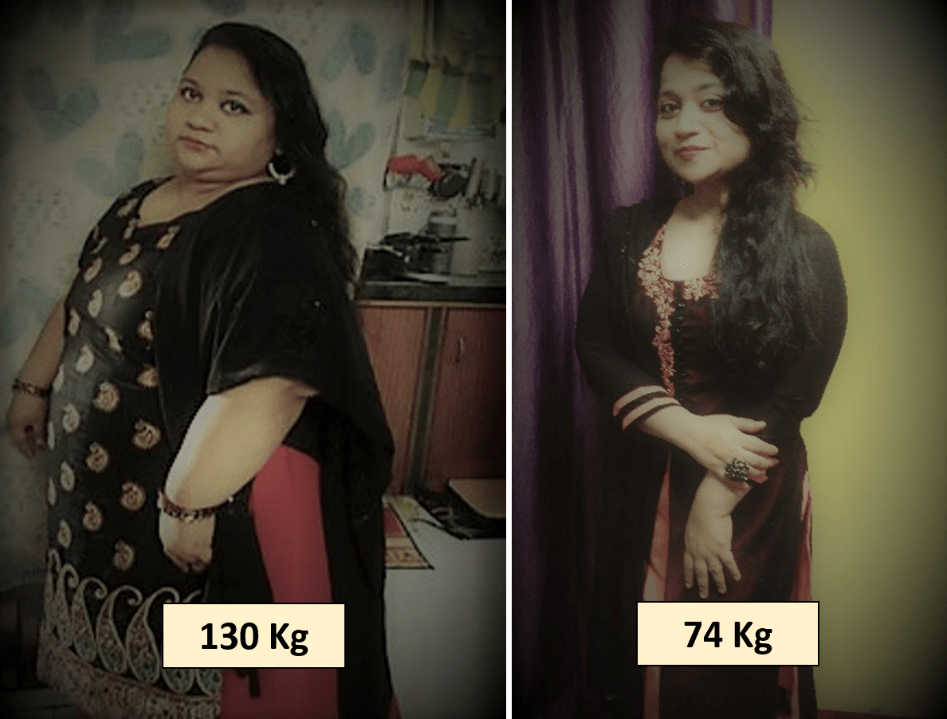
About Dr. Aparna Govil Bhasker
Dr. Aparna Govil Bhasker is an accomplished Bariatric Surgeon and Laparoscopic GI Surgeon. Extremely passionate about her field of specialization. She completed her MBBS and MS in General Surgery in 2006, from Mahatma Gandhi Institute of Medical Sciences (MGIMS), Sewagram. Set up in 1967 by none other than the first health minister of India, Ms. Sushila Nayar, MGIMS is deeply rooted in Gandhian ethics. Read more


Surgeon in India


Bariatric Surgery: Pros and Cons
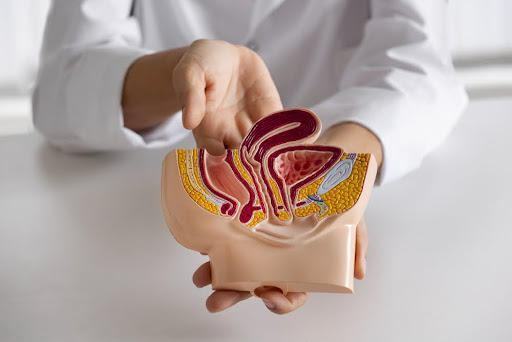
Types of Hernias and Their Treatment Options Explained
- Intra-Gastric Balloon Insertion Surgery
- Laparoscopic Adjustable Gastric Banding Surgery
- Gastric Sleeve Surgery / Laparoscopic Sleeve Gastrectomy
- Single Incision Sleeve Gastrectomy Surgery
- Laparoscopic Roux-en Y Gastric Bypass Surgery
- Laparoscopic Banded Roux-en Y Gastric Bypass Surgery
- Laparoscopic Mini Gastric Bypass Surgery /Omega Loop Bypass
- Laparoscopic Sleeve Gastrectomy with Duodeno-Jejunostomy Surgery
- Laparoscopic Duodenal Switch Surgery
- Laparoscopic Sleeve Gastrectomy with Duodenal Ileostomy (SADI) Surgery
- Laparoscopic Revisional/Redo Bariatric Surgery
- Metabolic Surgery for Diabetes
- Terms & Conditions
- Privacy Policy
- Sitemap

